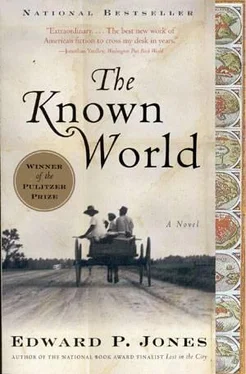Outside of Merryville, Louisiana, in Beauregard Parish, he came to a wide expanse of land that seemed without end, parched grass and soil widening with cracks that were a foot or more in some places. The trees seemed not to have grown up out of the ground but to have been placed on the land, like a piece of furniture in a room. His horse, on his own, began to move slowly and Counsel felt the animal might at any moment decide to turn around and head back. He would have abided by that decision. Then, little by little, the land greened and cypress after cypress appeared and the horse moved ahead with more confidence. Counsel saw pelicans and thought he could smell the sea. But he still saw no sign of human beings.
The green land began to even out and at last he could see a house and a smaller structure in the distance, a place he might reach in two hours or so depending upon how fast his horse would go. He took his time, thinking what he saw was some trick of a tiring mind, and he came to the house in about an hour. But after riding for that hour, he was back in a desolate place again. The land seemed incapable of growing anything but sorrow, yet, as Counsel looked about, he could see that some effort had been made to farm. And in a few spots he saw some success, though he did not make out what was growing. The crops were about three feet high. The house was leaning to the right, and the barnlike building next to it was leaning to the left.
A mule came out of the barn and looked away from where Counsel and his horse were and then looked at Counsel and moseyed out to him. The mule nudged the horse in the nose and the horse nudged back.
Counsel had seen the smoke from the chimney about a half hour earlier and he dismounted and went up to the door. Before knocking, he took one last look about. Everything seemed better from the porch; it was a place that might well sustain a man and his family, if sustain was just all he ever wanted. Pelts and game, squirrel and rabbit and somewhat larger animals Counsel had never seen before, hung from the ceiling of the porch from end to end.
The door was ajar. He knocked once and a woman opened the door wide, looked at him as if she were deciding whether he deserved her smile. She didn’t smile but turned to someone in the room and said, “It’s somebody.” Counsel found the woman attractive, especially after she moved her head and he saw the way her neck rose up to meet her hair. The beauty was fading and it was doing so at a fast pace. “Who somebody?” a man said.
A boy about twelve years old came to the door and told Counsel to come in. He called the woman “Ma” and told her to close the damn door after Counsel came in and she did so. A man was at a table in an area that passed for the kitchen. The floor was hard-packed earth. The room smelled heavily of smoke and the humidity hung thick. The house was much bigger than it appeared from the outside, but it was not a house of rooms but one giant one and each area seemed to have a function as rooms in a normal house would. Beds far to the right, stove and table in the back to the left, and near the front of the place was a living area where two girls smaller than the boy were playing on the floor with corncob dolls. Counsel could tell by the way one girl was talking that it was not friendly play.
The man was eating at the table and said to Counsel, “I’m Hiram Jinkins.”
Counsel told him who he was and that he was passing through and would appreciate a place to stay for the night, maybe a little something to eat. Jinkins pointed to a chair across the table from him and indicated that Counsel should sit. The chair had one leg shorter than the others and Counsel found it necessary to balance himself the whole time. He had the feeling that the man would not want him to move elsewhere. The only other empty chair was next to the man and the boy sat in that one soon after Counsel sat down.
“That Meg,” Hiram said, pointing to the woman who came up and took away the empty metal pan that Hiram had been eating from. “And this here Hiram number four,” and nodded sideways to the boy. Counsel said good day to them both. “You say you ain’t ate?” Hiram the man said. “That’s right,” Counsel said. “Well…,” and the woman soon returned with the same metal pan, now brimming with a stew that shared the pan with congealed grease. It had generous portions of meat. Counsel was too hungry to ask what the meat was. The woman set a spoon beside the pan. “Biscuits, too,” the boy said to his mother. “Don’t forget the goddamn biscuits.” Meg brought biscuits and Counsel ate. The girls were still playing in a far part of the room and the one girl with the mean talk had quieted.
“Where you from?” the boy said. “You Louisiana stock?” While he looked to be about twelve, his voice was husky and in a dark room he might have gone for a man.
“Georgia,” Counsel said, trying to remember all he could about the Estill farm.
The room was darkening as evening came on and Meg and the girls went about the place, lighting candles and two lanterns. The boy saw one of the girls with a lantern. He turned quickly in his chair and said, “Save the damn lanterns. You know better. Save the damn lanterns.”
“Where he say?” the man asked the boy softly.
“Georgia. Where your damn ears?”
The man touched both his earlobes at once and said, “Where they always been.”
“Well, act like it. He said Georgia clear as the damn day and you didn’t even hear him. You closer to him than I am and you still didn’t hear him.” For the very first time ever, Counsel missed the evenings with his family, Laura playing the piano, Belle reading to the younger children. Make up your mind, God, that’s all I ask.
“You can go eat shit, boy,” the man said. “Pick up your goddamn spoon and eat shit.”
“I’m doing anough of that already.”
Hiram, the man, said, “What you do in Georgia, Mr. Skiffington? I can tell you know your way round books. I can tell that.”
“How can you tell that?” Hiram, the boy, said. “How can you tell anything bout him when all he did was say his name and Georgia and come in here and eat our food? How can you say that, Pa?”
“Easy nough,” the man said. Out of the corner of his eye Counsel could see Meg standing at the window. There was a draft from somewhere and the candle in that part of the room wavered and now and again, with the intermittent light, she seemed to disappear. The girls were talking but he had no idea where in the huge room they were. “What you do in Georgia?” the man said again.
“I did some farming. I even had a little store, sold some dry goods and whatnot.”
“A man of everything,” Hiram, the man, said. “I like men of everything.”
“That ain’t what he said, Pa. He ain’t done everything and I don’t know why you make it out to be so.”
The man yawned. “I had three children die, then you come along,” he said. He crossed his arms and said to Counsel, “We can put you up in the barn. You think you can live with that?”
“Yes,” Counsel said. “And I’m thankful for that.” He stood up.
“I just know you are,” the boy said.
“Hiram,” the father said, “see Mr. Skiffington gets settled in the barn. Show him where the shithouse is.”
The boy said, “You see him get settled in the damn barn.”
The man held a fist out to Counsel. “Three of em went on by.” He opened one, two, three fingers. “Three of em and then he came along. God and his mysteries.” He shook his head. “Meg, see that this man gets settled in the barn.”
Meg had a candle and two blankets in her hands and led the way and Counsel followed to the barn, leading his horse. “You keep the candle,” she said once she had pointed out an agreeable spot for him to bed down, “but please don’t burn the place down. That would not do.” “I’ll be careful,” he said as she left.
Читать дальше












